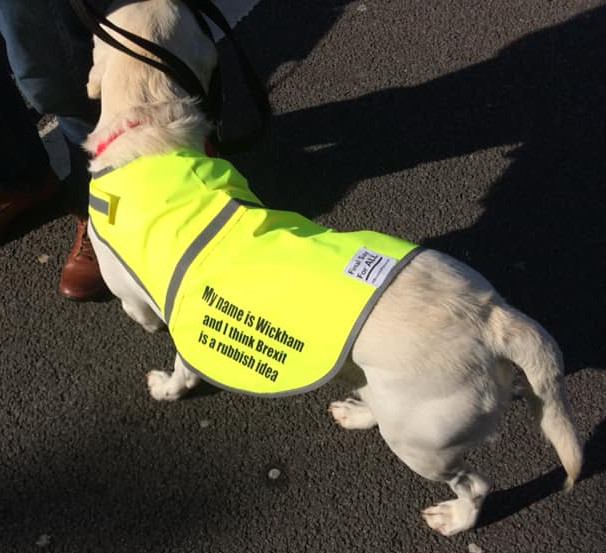Mae'r cynnwys hwn ar gael yn Saesneg yn unig.
As part of a series of blog posts on WISERD’s civil society and animal welfare research, here we look at the views of campaigners with civil society organisations (CSOs) about the impact of Brexit on animal welfare. This matters, for it aligns with a key focus in the academic literature, namely, how shifting patterns and processes of governance shape public policy. In other words, the way the structures and institutions in the state (and beyond) shape what government does to address problems and seek to improve well-being.
Analysis of our in-depth interviews with CSO campaigners reveals mixed views. However, the majority offer a negative assessment of Brexit’s impact on animal welfare, as well as dissatisfaction with the Tory Westminster government’s record. This topic is significant because 80 per cent of animal welfare law originates from our membership of the EU. Now that we’ve left, this legislation has been incorporated into domestic law. Animal welfare is a devolved matter and most of Westminster’s work relates to England –although both the Welsh and Scottish governments have expressed concerns over the potential for a Westminster power grab in relation to the repatriation of former EU powers.
In 2021, the Tory government published its Action Plan for Animal Welfare. The Conservative administration promoted this in hubristic post-Brexit terms: “Now that we have left the EU, the UK has new freedoms to further strengthen animal welfare standards and reinforce its position as a global champion of animal rights”. Seven years on from Brexit, this CSO campaigner’s recent assessment concludes: “In terms of captive and free-living wild animals, progress has been almost non-existent”. They continued, “commitments on biodiversity protection and recovery have been diluted… and promises to address welfare issues affecting both free-living and captive wild animals remain largely unfulfilled”.
CSOs have been coruscating in their condemnation of the government’s recent reneging on two pieces of legislation, the Animals Abroad and Kept Animals Bills. One said, ‘The Government has failed to keep its promises and meet the expectations of the British public… We will continue our fight to end the cruel exploitation of animals and the suffering it causes”. Another noted, “We are incredibly frustrated that the Government has dropped the Kept Animals Bill, [it included…] banning the live export of farmed animals, a key Brexit promise… Once again, it appears that empty promises to protect animals have been pushed aside, along with the wishes of 72% of the British public who want to see more and stronger legal protections for animals”.
CSOs also express widespread concerns about other post-Brexit developments. For example, one noted: that “new trade agreements will be made with countries that have lower animal welfare standards. For example, the USA gives growth hormones to their cows, still uses conventional battery cages (in most states), doesn’t have species-specific slaughter regulations and still uses sow stalls in most pig production”.
Our interviewees have also expressed frustration about how Brexit has made it harder to lobby lawmakers at Westminster. One complained, “the government “just can’t prioritize anything above Brexit anymore… the biggest Brexit problem we’ve got is that it’s. Absorbs the oxygen from anything that isn’t Brexit”. Another reflected, “The Westminster government “had no understanding of how they would leave the EU, and we all know the difficulties that then arose from that”. Another campaigner explained “much of the current cost of living crisis is actually down to Brexit… that has probably been hidden as a problem in amongst all the other bad news. Brexit has certainly been part of the reason why people’s costs have gone up, which is then having a knock-on effect”.
A manager with an animal rescue charity gave harrowing details of this and how austerity has seen a surge in abandoned animals. They said “So what we’re seeing at the moment is the result of a perfect storm… during COVID [we had a] huge increase in dog ownership. Mainly being supplied from low welfare breeders… followed by the cost-of-living crisis… so they’re needing to surrender their pets”.
Another CSO campaigner offered a gloomy prognosis, “the EU is probably going to overtake the UK in terms of animal welfare. For example, the EU is looking at phasing out all cages in farming…The UK government doesn’t seem to be near to that so, you know, if we were in the EU, then on that issue, the UK government’s hand would be forced”.
Read the previous posts here:
Devolution and animal welfare lobbying: exploring the views of civil society campaigners
New analysis: Animals in sport – exploring civil society welfare campaigning
Civil society activism and animal welfare policy divergence
Civil society and animal welfare lobbying at Westminster
Research interviews by Kathleen Job.
Image credit: Ritchie333 Creative Commons Attribution-ShareAlike 4.0 License.

